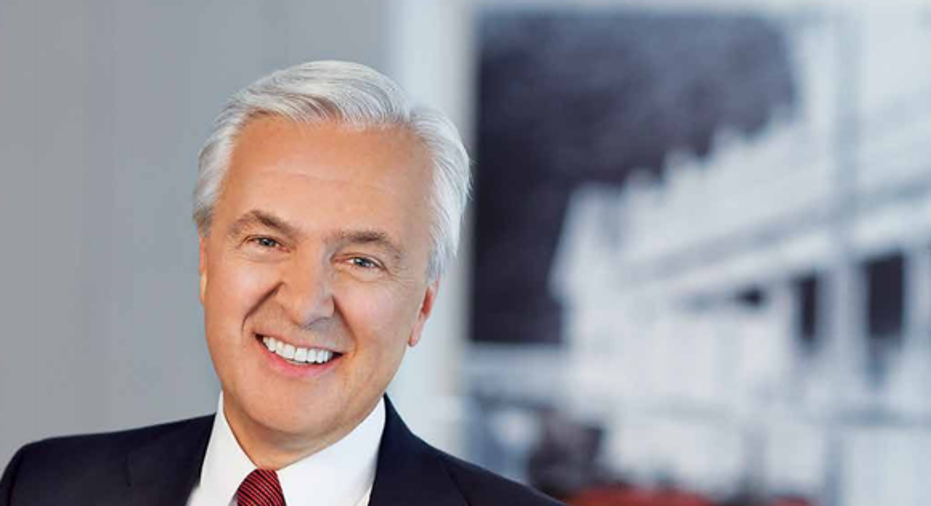Former Wells Fargo CEO John Stumpf Could Be in Serious Trouble

Former chairman and CEO of Wells Fargo, John Stumpf. Image source: Wells Fargo.
When I think about John Stumpf, the now-disgraced former chairman and CEO of Wells Fargo (NYSE: WFC), I'm reminded of those stories you see on TV about the guy-next-door who had been living a secret life for years.
"He seemed so normal," neighbors would say.
"He always showed up to work on time and did his job," co-workers would add.
But then, for one reason or another, everything would come crashing down. Something would cause someone to peek behind the thin veneer of respectability and discover the truth.
In Ken Lay's case, it was the recession following Sept. 11, 2001 that revealed the inner machinations at Enron.
In Bernie Madoff's case, it was the financial crisis that caused his multibillion dollar Ponzi scheme to collapse.
And in John Stumpf's case, it was a fake-account scandal in which low-level employees were, if a growing multitude of allegations are to be believed, all but forced to commit fraud in order to keep their jobs and boost Wells Fargo's performance and thereby Stumpf's voluptuous paycheck -- he earned $20 million a year.
You may think that comparing Stumpf to Lay and Madoff is hyperbolic, but I disagree.
Like them, he carefully cultivated an image of infallibility. He lambasted other banks for seeking growth for the sake of growth. And he loudly trumpeted Wells Fargo's Vison & Values which made, in hindsight, preposterous claims like:
Meanwhile, while analysts and commentators like me were distracted by Stumpf's diversionary tactics, thousands of the banks' employees were opening millions of fake accounts for customers. Stumpf claimed that the fraud went back to only 2011, but there's now clear evidence that it may have gone all the way back to 2005, if not to 1998.
All along the way, moreover, those employees who didn't feel comfortable committing fraud and who blew the whistle to Stumpf, the bank's "ethics" line, its human resources department, or to Wells Fargo's board of directors, were fired or intimidated into continuing the fraud.
"We were constantly told we would end up working for McDonald's," a former employee told the Los Angeles Times, which broke the story in Dec. 2013. Never mind the fact that McDonald's has never been caught intentionally defrauding millions of customers.
Another employee who refused her supervisors' demands to open fake accounts was told that she'd never be able to find another job at a bank ever again.
Wells Fargo sought to make this happen by filing a U5 with securities regulators, claiming that she "failed to perform job duties." According to bankers I've spoken to, a document likethat should NEVER have been filed against a personal banker, who sells FDIC-insured banking products, not securities. (One banker I spoke to who has hiring and firing authority had never even heard of a U5 filing.)
Another 12-year veteran of the company who blew the whistle received a menacing letter from his superiors, threatening him that his employment was "at will" and under the "complete and arbitrary discretion" of his superiors. The letter concluded by saying "you will never be allowed back in the same office, sue us if you disagree."
He did, and he won the case.
And all along the way, Stumpf was getting letters and emails from these people. And he did nothing to stop it.
He did nothing to stop the abuse of customers.
And he did nothing to stop the abuse of his employees.
In this way, he was complicit in -- dare I say the leader of -- a conspiracy that not only defrauded millions of customers, many of whom were undoubtedly the most vulnerable members of our society such as octogenarians living on $1,100 a month, but also silenced those who tried to end the scam.
These people believed that alerting Stumpf would give them safe harbor from their immediate superiors who threatened and belittled them.
But Stumpf ignored them. He allowed his managerial goon squad to defame their reputations and attempt to destroy these peoples' abilities to earn a living for their families.
It's like a horror movie where the victim runs unwittingly into the arms of a seeming do-gooder, only to discover that they were now in the grasps of the perpetrator they were fleeing from.
But rest assured that Stumpf will not escape this with his reputation intact.
Speaking under oath, before Congress, Stumpf said that he didn't learn about the fraud until late 2013.
That's eight years after he purportedly began receiving emails and letters from whistleblowers. And it was nearly three years after Wells Fargo began cleaning house in its retail operations, firing 1,000 employees a year who, if the bank is to be believed (ha ha), were furthering the fraud, or who, seemingly just as likely, were fired because they refused to participate in it.
In short, it seems farfetched to think that Stumpf won't, at the very least, be indicted for lying to Congress. His claim that he didn't know about any of this until late 2013 is just patently absurd on its face.
A secret billion-dollar stock opportunity The world's biggest tech company forgot to show you something, but a few Wall Street analysts and the Fool didn't miss a beat: There's a small company that's powering their brand-new gadgets and the coming revolution in technology. And we think its stock price has nearly unlimited room to run for early in-the-know investors! To be one of them, just click here.
John Maxfield owns shares of Wells Fargo. The Motley Fool owns shares of and recommends Wells Fargo. Try any of our Foolish newsletter services free for 30 days. We Fools may not all hold the same opinions, but we all believe that considering a diverse range of insights makes us better investors. The Motley Fool has a disclosure policy.



















